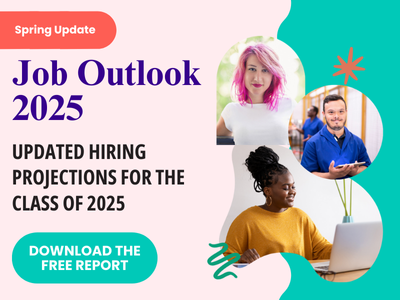During my college years, I often found myself surrounded by individuals who would mention how little sleep they’d gotten the night before and how busy and tired they were from their many extracurricular commitments. I was never quite sure if they were trying to garner sympathy, start a conversation, or boast about their capacity for stress; however, these encounters did make me wonder how productive a person could be in a realistic and sustainable way, and moreover, what are the metrics used to define and measure productivity, and who’s responsible for establishing them?
My complicated relationship with productivity was heavily influenced by that social environment, and I’m still unable to precisely grasp the term.
Now, after working in career services for more than five years, I am used to hearing phrases like “I’m not doing enough” or “I feel like I’m behind” from my students as they’re trying to navigate the parallel roads of their college careers and the search for present or future employment, and their common struggle inspired me to discuss a few observations I’ve made about productivity that I believe will add both nuance and clarity to this complex topic.
While I am far from the first to tackle this issue in the context of higher education and the life changes that follow, I believe that performing productivity is an underdiscussed but critical factor contributing to mental health issues for college students. My hope is that the questions below will foster engaging dialogue and serve as a reminder to approach one’s educational and professional journey with intentionality and excitement, and at a healthy pace.
Whose Timeline?
Statements like “I’m behind” or “I’m not doing enough” highlight common misconceptions that students may hold about productivity. These phrases imply a predetermined timeline where individuals must meet or surpass certain benchmarks, such as completing an internship by junior year. These expectations can be frustrating for students who may struggle to fulfill arbitrary norms within specified timeframes, and this struggle can be exacerbated by social media, where their peers may showcase their professional achievements.
Although the pressure to meet or exceed unspoken standards typically revolves around conformity, it’s crucial to prioritize informed decision-making over one-size-fits-all approach to schedules and milestones. To help my students put their ideas about productivity into perspective, I like to ask the following questions:
- Am I mentally prepared to focus on my professional goals?
- What are the benefits and drawbacks of meeting certain milestones by specific deadlines (e.g., creating a LinkedIn profile before starting my second year)?
- What are the implications of completing certain experiences (e.g., internships or study abroad) based on timelines imposed by prevailing cultural norms?
- Am I pursuing these experiences for personal and professional growth or due to external pressures (e.g., from friends or family)?
Conclusion
With professional pursuits, quality invariably outweighs quantity. This principle applies particularly well to internships, where not all opportunities are created equal. Engaging in one well-structured internship with clearly defined and beneficial learning objectives is far better than participating in several disorganized ones, even if they line up with the “ideal” undergraduate timeline.
The dilemma of conformity extends far beyond the undergraduate years. Societal pressures—to marry, have children, attain specific titles or salary figures by certain ages, or own particular material goods—are powerful, but they’re still arbitrary. Are these pressures influential simply because they are socially constructed? Can individuals pivot away and establish alternative benchmarks aligned with their own timelines, values, and comfort levels, diverging from mainstream expectations? Is there a cost to forging one’s own path?
I believe the responsibility to critically assess this dilemma, at least concerning education and early career timelines, lies collectively with career services offices and the students they advise. Vulnerability is crucial for students, balanced with open, unassuming dialogue and actionable steps tailored to each student’s comfort levels. The right conversations can—and will—promote healthy attitudes toward productivity as our students navigate higher education’s intense and competitive environments.







